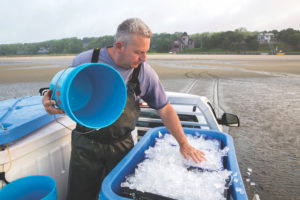WELLFLEET — Ever wonder how all those oysters get to OysterFest? This year, Wellfleet Shellfish Promotion and Tasting (SPAT), the nonprofit that organizes the OysterFest, is expecting to serve 130,000 oysters to around 20,000 people over the course of the two-day festival on the weekend of Oct. 19-20, according to Michele Insley, SPAT’s executive director.
On Tuesday and Wednesday before OysterFest, trucks from Big Rock Oyster in Harwich will be stationed on the Wellfleet pier to pick up oysters, which will then be hauled back to Harwich for processing. All oysters served at the festival, both wild and farmed, are from Wellfleet’s big, protected harbor.

For safety reasons, all oysters in Massachusetts must be processed before sale by a licensed wholesaler to prevent the growth of Vibrio parahaemolyticus, a toxic bacteria that can cause illness if consumed in large quantities.
Big Rock Oyster owner Aaron Brochu said that when oysters are harvested and exposed to air, they close and stop filtering water. In warm conditions, Vibrio trapped inside reproduces quickly, growing to illness-producing levels.
To prevent that from happening, oysters must be placed on ice within two hours and further cooled to 45 degrees F within 10 hours of being harvested.
Brochu said that the Big Rock Oyster facility can easily process the large quantity of oysters for next weekend, adding that 130,000 oysters “might sound like a lot, but we sell that many every day. That’s what we do — we handle that kind of volume.”
Wellfleet Shellfish lost bid
In past years, SPAT contracted with the Wellfleet Shellfish Company to process oysters at its facility in Eastham. But brothers Alex and Mac Hay, owners of Wellfleet Shellfish Company as well as several seafood restaurants and fish markets, resigned from the SPAT board this year, and Wellfleet Shellfish lost its bid to process shellfish for OysterFest 2019.
Insley said that SPAT had put out a request for proposals, and that Big Rock fit the bill. “Big Rock was chosen for a number of reasons, primarily cost,” she said, adding that they had also offered to pick up oysters from fishermen directly at the pier.
Previously, shellfishermen had to drive their catch to Wellfleet Shellfish’s facility in Eastham.
Brochu said that SPAT “reached out to us. We were one of the few people who could physically handle the job on the Cape, which is why they chose us.”
According to Alex Hay, Wellfleet Shellfish Company provided oyster processing for the fest at bargain rates — “at a loss,” he said. Both he and his brother had also donated time and energy to organizing the annual event for the past 18 years.
“Usually, I have to take eight weeks to get ready for this festival,” Alex said. “It’s burdensome. It’s had an impact on our company. When you take the two principals and pull them offline for eight weeks, we just go flatline.”
Changes in leadership and on stage
Alex Hay said that he had stepped down from the board due to a disagreement over SPAT’s mission, which started “strictly as a marketing organization.” Initially, SPAT worked to develop the Wellfleet oyster as an international brand and to prolong the oyster season.
But over the years “it became very frustrating,” he said. “Somehow, we got funneled into a charity organization.”
When asked what issues led to the Hays stepping down, Insley said that there had been some concerns about transparency on the SPAT board.
“If somebody [on the board] has a related interest, they might excuse themselves or clarify it,” Insley said. “We have procedures to handle [conflicts of interest]. But where is that explained to the public? So people could have perceived that.”
Alex Hay said that his involvement in SPAT was not a conflict of interest but a natural fit. His commitment to Wellfleet’s shellfish industry, he said, makes him care even more deeply about OysterFest’s success. “It’s been a long passion of mine, and I felt strongly for it,” he said. “I worked hard to set the standards high.”
Insley said that new board members Wil Rhymer and Andrew Jacob, who filled Mac and Alex Hay’s spots, provide fresh perspectives with financial and wild fishery expertise, respectively.
The change in leadership will affect the festival’s proceedings. Mac Hay, as SPAT board president, hosted the oyster shucking competition in previous years, with Eric Williams acting as MC. Neither Hay nor Williams will be onstage for the shuck-off this year.
Instead, SPAT board member Jodi Birchall will be hosting. “It’s always been our policy to have a board member on the stage,” Insley said. “Eric will not be there. He’s using this as his opportunity to transition [out of his role]. We did ask him, but he declined.”
Since he hasn’t had any involvement in planning OysterFest this year, Alex Hay said that he’s able to spend more time with his family this fall and focus on connecting with his customers.
“I’m thrilled not to be burdened down,” Alex said. “I can focus on the mission: selling oysters.”



